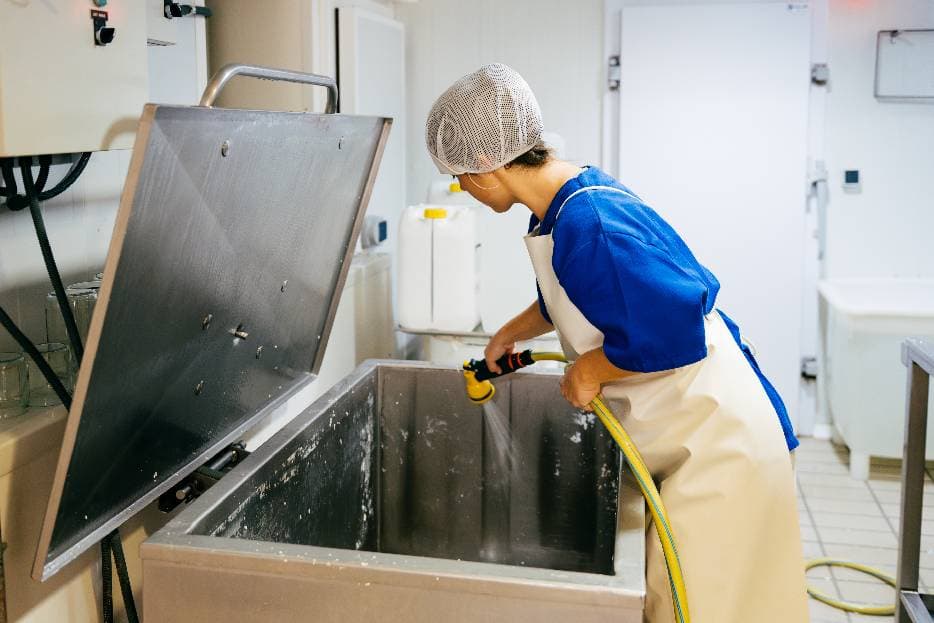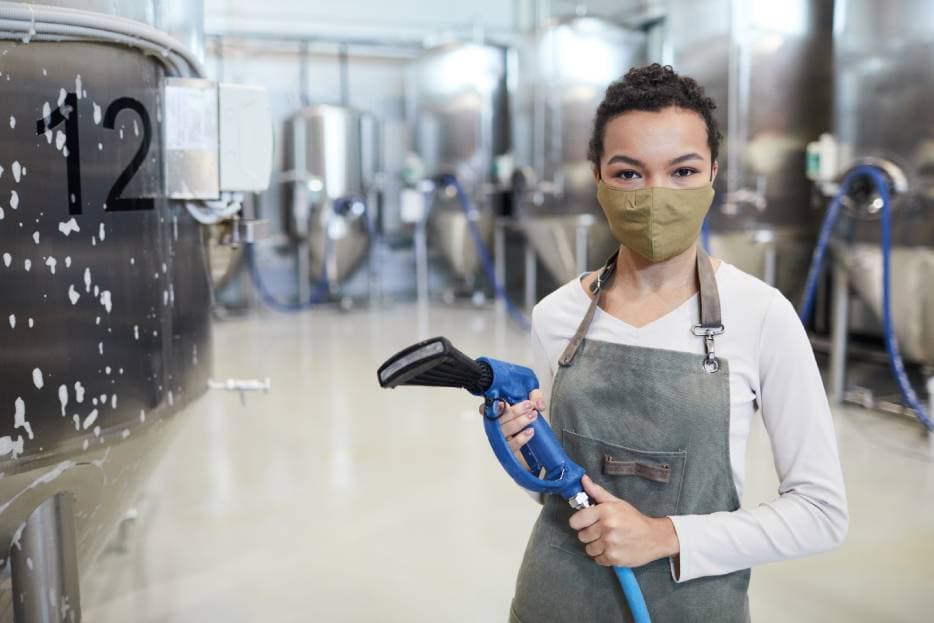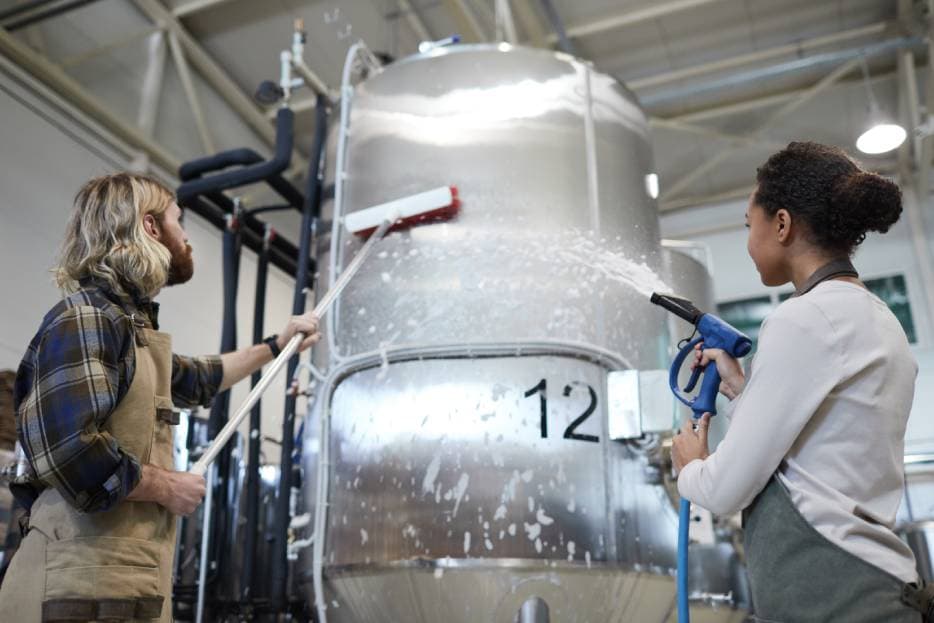In a previous article we explored how automation is implemented in cleaning services, highlighting the way technology has transformed processes to make them faster and more efficient.
However, beyond technological innovation, there is a fundamental aspect that often goes unnoticed: proper cleaning as an essential pillar for safety in factories.
A clean industrial environment not only reflects order and professionalism, it is also a preventive measure against accidents, machinery failures, and health problems among workers. Dust, spills, or waste accumulation can become serious risks if not addressed promptly.
In this article we will discuss the common risks that arise from lack of cleaning in factories, the direct benefits of maintaining safe and hygienic industrial spaces, recommended practices for effective cleaning, the role of staff in compliance with these measures, among other aspects.
Common Risks from Lack of Cleaning in Factories
Before understanding how proper cleaning through cleaning services in Monterrey contributes to safety, it is important to identify the main risks that arise when this practice is not given due importance in industrial environments; for example:

Dust and Waste Accumulation
Industrial dust and solid waste, if not removed frequently, can affect air quality, cause failures in sensitive equipment, and increase the risk of fire. In addition, constant presence of airborne particles represents a danger to workers’ respiratory health.
Spills and Slippery Surfaces
Spilled liquids, whether water, oils, or chemical substances, are one of the most common causes of falls and accidents in factories. A slippery surface not only compromises staff safety but also damages machinery if not addressed immediately.
Fire Hazards
The concentration of flammable materials such as oils, grease, or fine dust can be the trigger for industrial fires. In factories where chemicals are used or sparks are generated during processes, the lack of cleaning services in Guadalajara considerably increases this danger.
Machinery Damage
Industrial equipment requires optimal conditions to operate efficiently. Accumulated dirt can clog systems, accelerate wear of parts, and cause unexpected shutdowns, endangering both worker safety and plant productivity.
Benefits of Proper Cleaning for Health
Keeping a factory clean is not just an aesthetic issue; it is an integral strategy that strengthens workplace safety, protects resources, and contributes to productivity.
Some of the most relevant benefits include:
Prevention of Workplace Accidents
Regular cleaning eliminates obstacles, spills, and debris that could become risk factors. By reducing the chances of falls, slips, or fires, a safer environment is created for all staff.
Greater Efficiency in Machinery Use
Industrial equipment operating in dust- and dirt-free environments experience fewer failures and require less frequent repairs. This not only extends machinery life but also ensures production processes run without dangerous interruptions.
Protection of Workers’ Health
A clean space reduces exposure to harmful agents that can cause respiratory illnesses, skin irritations, or allergies. Taking care of workplace hygiene means taking care of the most valuable resource in any factory: its people.
Compliance with Safety and Hygiene Regulations
Finally, proper cleaning facilitates compliance with industrial safety regulations. Having hygiene protocols in place demonstrates corporate responsibility and prevents penalties from official inspections.
Recommended Cleaning Practices in Factories
To ensure that cleaning truly contributes to safety, occasional actions are not enough; a structured plan with well-defined practices and consistent measures is required, such as:
Cleaning and disinfecting work areas
Proper disposal of industrial waste
Preventive protocols for equipment
Use of appropriate signage and products
Role of Staff in Safety and Cleaning

The role of staff in factory safety and cleaning is essential, since they interact daily with processes, machinery, and workspaces.
An industrial hygiene policy will hardly be effective if workers are not actively involved. Ongoing training in cleaning and safety procedures allows each employee to know how to act in the face of common risks, from handling a spill to identifying an area that requires maintenance.
Likewise, raising awareness about the importance of maintaining order and cleanliness helps create a preventive culture, where everyone takes responsibility for protecting their own integrity and that of their colleagues.
Implementation of an Industrial Cleaning Plan
Beyond what has already been mentioned, for cleaning in factories to be truly effective, it is necessary to implement a structured plan that considers every detail of the work environment.
The first step is to conduct a risk assessment that identifies critical areas where accumulation of dust, waste, or liquids poses a danger.
From this diagnosis, cleaning routines are defined with an appropriate frequency according to the nature of operations, including specific procedures for equipment, floors, storage areas, and high-traffic zones.
Clear assignment of responsibilities among workers and supervisors ensures the plan is carried out in an organized manner, while checklists and periodic reports allow monitoring of progress.
Cleaning in factories is key to preventing accidents, safeguarding staff health, and maintaining productivity. A clean environment not only protects, it also strengthens workplace safety.
At Quickshine, we know that safety begins with cleanliness. We invite you to follow our blog and discover more tips and innovations on industrial hygiene.
